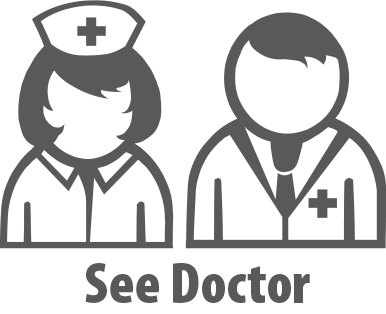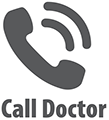Ear, Nose & Throat Conditions
Hearing Loss
People over age 50 are likely to lose some hearing each year. The decline is usually gradual. About 30% of adults age 65 through 74 and about 50% of those age 85 and older have hearing problems.
Hearing problems can get worse if they are ignored and not treated. People with hearing problems may withdraw from others because they may not be able to understand what others say. Hearing loss can cause an older person to be labeled “confused” or “senile.”
Signs & Symptoms
• Words are hard to understand. This worsens when there is background noise.
• Certain sounds are overly loud or annoying.
• Hearing a hissing or ringing background noise. This can be constant or it can come and go.
• Concerts, TV shows, etc. are less enjoyable because much goes unheard.
Causes
Presbycusis (prez-bee-KU-sis). This is a gradual type of hearing loss. It is common with aging. With this, you can have a hard time understanding speech. You may not tolerate loud sounds. You may not hear high pitched sounds. Hearing loss from presbycusis does not cause deafness.
• Ear wax that blocks the ear canal.
• A chronic middle ear infection or an infection of the inner ear.
• Medicines (e.g., aspirin).
• Blood vessel disorders, such as high blood pressure.
• Acoustic trauma, such as from a blow to the ear or from excessive noise. Noise-Induced Hearing Loss (NIHL) can be from a one-time exposure to an extremely loud sound or to repeated exposure to loud level sounds.
• Ménière’s disease. This is a problem of the inner ear. The hearing loss comes and goes. Dizziness is also a symptom.
• Small tumors on the auditory nerve. Brain tumor (rarely).
Treatment
• Earwax is removed by a health care provider.
• Hearing aid(s). These make sounds louder.
• Speech reading. This is learning to read lips and facial expressions.
• Auditory training. This helps with specific hearing problems.
• Surgery. This can be done if the problem requires it.
Questions to Ask
Question
01
When your child is awake, does he or she not respond to any sound, even a whistle or a loud clap?

You should be seen by your doctor for medical advice. Contact your doctor or health care provider to find out how soon you should be seen.
x
Question
02
With hearing loss, do any of these problems occur?
• A discharge from the ear.
• Ear pain doesn’t go away.
• You feel dizzy or it feels like things are spinning around you.
• A recent ear or respiratory infection.
• It feels like your ears are blocked.

You should be seen by your doctor for medical advice. Contact your doctor or health care provider to find out how soon you should be seen.
x
Question
03
Is a nondigital watch not heard when held next to the ear?

You should be seen by your doctor for medical advice. Contact your doctor or health care provider to find out how soon you should be seen.
x
Question
04
Do you hear a ringing sound in one or both ears all of the time?

You should be seen by your doctor for medical advice. Contact your doctor or health care provider to find out how soon you should be seen.
x
Question
05
Did you lose your hearing after exposure to loud noises, (e.g., rock concerts, power tools, firearms, etc.) and has this not improved?

Call your doctor or health care provider and state the problem. He or she can decide what you should do.
x
Self-Care / Prevention
For Gradual, Age-Related Hearing Loss
• Ask people to speak clearly, distinctly, and in a normal tone.
• Look at people when they are talking to you. Watch their expressions.
• Try to limit background noise when speaking with someone.
• In a church or theater, sit in the 3rd or 4th row with people sitting around you.
• Install a flasher or amplifier on your phone, door chime, and alarm clock.
To Hear Sounds Better
• Use a hearing aid. There are many kinds. Examples are ones worn:
– In-the-Ear (ITE).
– Behind-the-Ear (BTE).
– In-the-Canal (ITC).
• To find the hearing aid that works best for you, see an audiologist. Ask him or her about a trial period with different hearing aids to find one you are comfortable with.
• Use devices and listening systems that help you hear better when you use your telephone, mobile phone, TV, stereo, etc.
To Clear Earwax
Use only if the eardrum is not ruptured. Check with your doctor if you are not sure.
• Lie on your side. Using a syringe or medicine dropper, carefully squeeze a few drops of lukewarm water into your ear (or have someone else do this). Let the water remain there for 10 to 15 minutes and then shake it out. Now, squeeze a few drops of hydrogen peroxide, mineral oil, or an over-the-counter cleaner, such as Debrox, into the ear. Let the excess fluid flow out of the ear.
• After several minutes, put warm water in the ear again. Let it stay there for 10 to 15 minutes. Tilt the head to allow it to drain out of the ear.
Repeat this entire procedure again in 3 hours if the earwax has not cleared.
Resources
American Speech-Language Hearing Association
800.638.8255
Better Hearing Institute
800.EAR.WELL (327.9355)

Download an offline pdf file.
RELATED ARTICLES
2021 © American Institute for Preventive Medicine - All Rights Reserved. Disclaimer | www.HealthyLife.com








